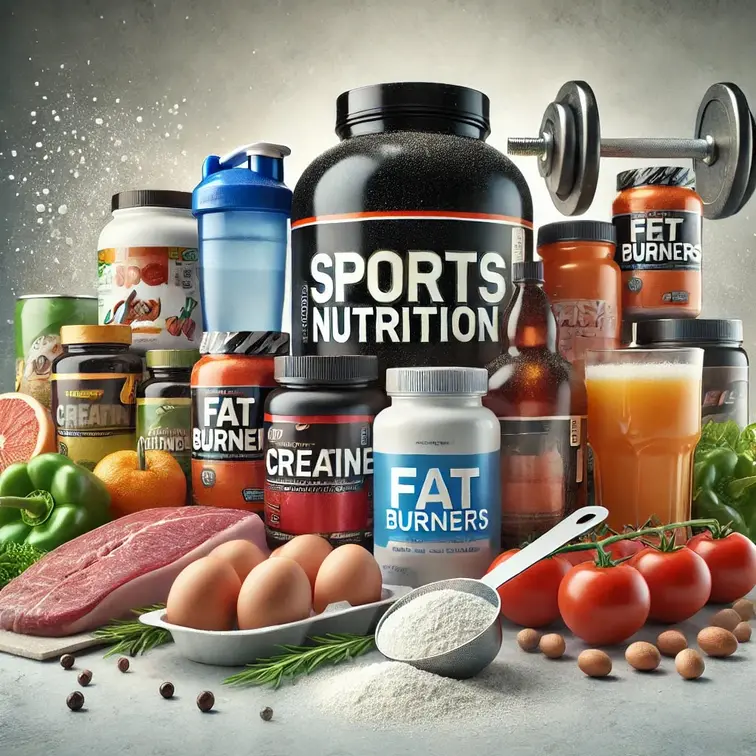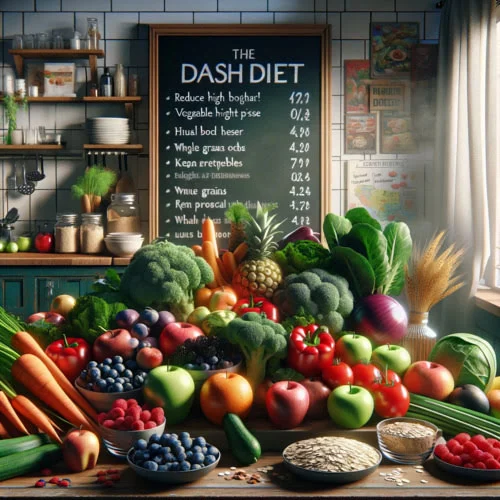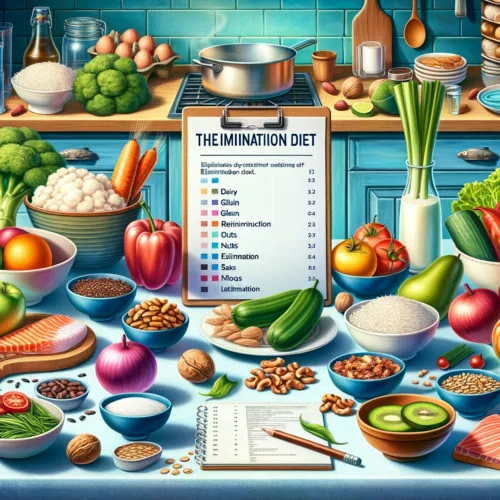Hello, dear readers! Today, we will talk about a crucial component of any athlete’s success—proper nutrition. Whether you are a professional athlete or simply want to stay in shape, understanding the basics of sports nutrition will help you achieve better results and maintain your health.
Why is Sports Nutrition So Important?
Sports nutrition is not just a trendy phrase. It is a scientifically based approach to eating that helps athletes:
- Maintain high energy levels: Proper nutrition provides the body with the necessary “fuel” for intense workouts.
- Recover faster after workouts: Certain nutrients help muscles recover more quickly, reducing the time needed for rest between training sessions.
- Strengthen immunity: Intense training can weaken the immune system, but proper nutrition helps maintain it.
- Reduce the risk of injuries: Some nutrients are essential for bone and joint health, which can help prevent injuries.
- Achieve optimal athletic performance: The right combination of nutrients can improve endurance, strength, and overall performance.
Basics of a Balanced Diet for Athletes
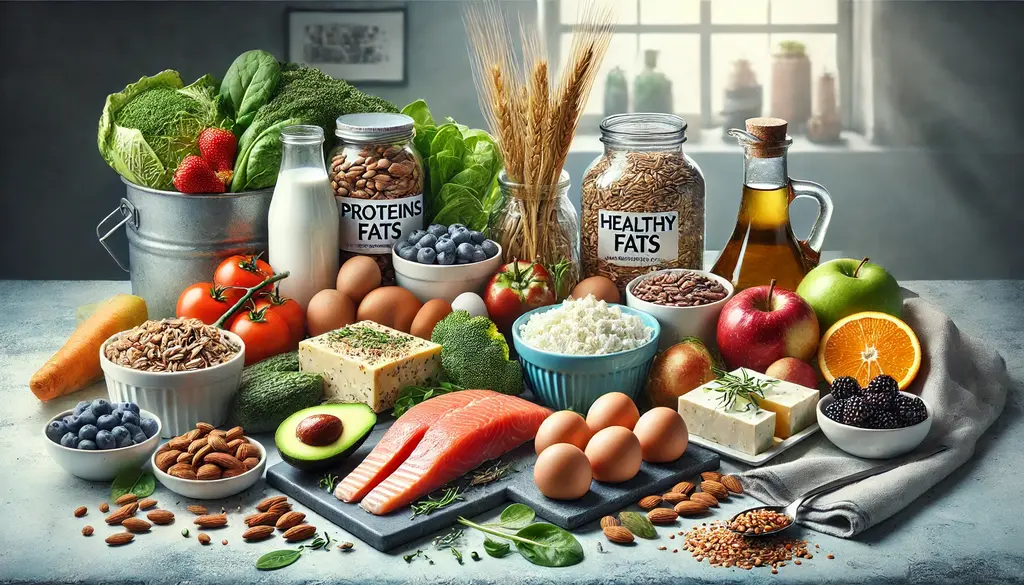
A balanced diet is the foundation of sports nutrition. It should include the right ratio of the three main components: proteins, fats, and carbohydrates. Let’s take a closer look at each of them.
Proteins
Proteins are the building blocks of our muscles. They are essential for the growth and repair of tissues. Athletes typically require more protein than those leading a sedentary lifestyle.
The recommended daily protein intake for athletes ranges from 1.2 to 2 grams per kilogram of body weight, depending on the intensity of training and the type of sport.
Good sources of protein include:
- Chicken breast: Contains about 31 grams of protein per 100 grams
- Fish: For example, salmon contains about 22 grams of protein per 100 grams
- Eggs: One large egg contains about 6 grams of protein
- Cottage cheese: About 18 grams of protein per 100 grams
- Legumes: Lentils contain about 9 grams of protein per 100 grams when cooked
Fats
Not all fats are harmful! Healthy unsaturated fats play an important role in an athlete’s diet. They are involved in hormone production and joint health. Additionally, fats are an important energy source, especially for endurance sports.
The recommended fat intake for athletes is about 20-35% of the total caloric intake.
Sources of healthy fats include:
- Avocado: Contains about 15 grams of healthy fats per 100 grams
- Nuts: For example, almonds contain about 50 grams of fats per 100 grams
- Olive oil: 100% fats, most of which are healthy monounsaturated fats
- Fatty fish (salmon, mackerel): Rich in omega-3 fatty acids
Carbohydrates
Carbohydrates are the main source of energy for our body. They are especially important for athletes as they provide quick and efficient “fuel” for muscles during workouts.
Athletes should prefer complex carbohydrates, which provide long-lasting and stable energy supply. The recommended carbohydrate intake for athletes can range from 3 to 12 grams per kilogram of body weight per day, depending on training intensity.
Sources of complex carbohydrates include:
- Whole grains: Oats, buckwheat, brown rice
- Vegetables: Broccoli, carrots, sweet potatoes
- Fruits: Apples, bananas, berries
- Legumes: Beans, lentils, chickpeas
Micronutrients and Vitamins
Micronutrients and vitamins play a key role in metabolism and maintaining the health of athletes. Although they are not an energy source, they are necessary for many biochemical processes in the body.
Especially important for athletes:
- B vitamins: Help in energy production. They can be found in whole grains, meat, eggs, and legumes.
- Vitamin C: Strengthens immunity and aids in tissue recovery. Rich sources include citrus fruits, kiwi, and bell peppers.
- Magnesium: Helps muscle recovery and reduces the risk of cramps. Found in dark green leafy vegetables, nuts, and seeds.
- Iron: Improves oxygen transport in the blood, which is crucial for endurance. Found in red meat, spinach, and lentils.
For most athletes, a balanced diet provides sufficient vitamins and minerals. However, in some cases, additional intake of vitamin and mineral complexes may be required. This decision should be made after consulting with a doctor or sports dietitian.
Water Balance
Maintaining water balance is often overlooked but critically important for athletes. Dehydration can significantly impair performance and even lead to injuries.
The water requirement for athletes is higher than for those leading a sedentary lifestyle due to fluid loss through sweat during workouts.
It is recommended to drink:
- 400-600 ml of water 2-3 hours before training
- 200-300 ml every 15-20 minutes during training
- After training: 1.5 liters for every kilogram of body weight lost
It is important to note that fluid needs are individual and depend on many factors, including training intensity, climate, and personal characteristics.
Signs of dehydration include: dry mouth, dark urine, dizziness, fatigue. If you notice these symptoms, replenish your body’s fluid reserves immediately.
Athlete’s Eating Schedule
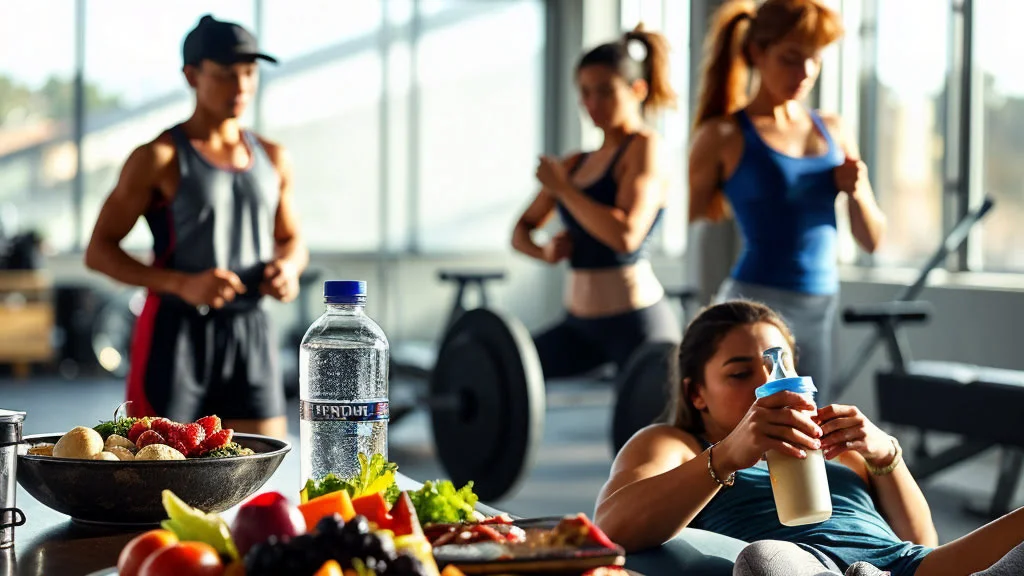
Proper eating schedule is as important as the composition of the food. Regular meals help maintain stable energy levels and provide the body with the necessary nutrients throughout the day.
Here are some basic rules:
- Eat frequently and in small portions (5-6 times a day): This helps maintain stable blood sugar levels and ensures a constant flow of energy.
- Do not skip breakfast: Morning meals “kickstart” metabolism and provide energy for the first half of the day.
- The last meal should be 2-3 hours before bed: This gives the body time to digest food and promotes better sleep.
- Plan meals around workouts: This helps provide the body with the necessary energy for training and aids recovery afterwards.
- Try to eat at the same time every day: This helps set the body’s biological clock and improves digestion.
Nutrition Before, During, and After Workouts
Proper nutrition before, during, and after workouts plays a key role in achieving maximum training efficiency and quick recovery.
Nutrition Before Workout
The goal of pre-workout meals is to provide the body with energy without overloading the digestive system.
2-3 hours before a workout, eat easily digestible food rich in carbohydrates and moderate in protein. For example:
- Oatmeal with fruit: Complex carbohydrates from oats will provide a long-lasting energy boost, and fruits will add quick carbs and vitamins.
- Whole grain toast with peanut butter: A combination of carbohydrates and protein for stable energy.
- Banana and a handful of nuts: Quick carbs from bananas and healthy fats from nuts.
Avoid fatty and hard-to-digest foods before workouts, as they can cause discomfort during exercise.
Nutrition During Workout
For most people, simply drinking water during a workout is enough. But if your workout lasts more than an hour or takes place in hot conditions, you can use sports drinks with electrolytes. They help replenish the loss of salts through sweat and provide quick carbohydrates to maintain energy.
For very long workouts (such as a marathon), it may be necessary to consume carbohydrate gels or light snacks to maintain energy levels.
Nutrition After Workout
Proper nutrition after a workout is critical for recovery. Within 30-60 minutes after training, it is important to replenish glycogen stores and provide muscles with protein for recovery and growth.
Good options include:
- Protein shake with banana: Fast-absorbing protein and carbohydrates for quick recovery.
- Greek yogurt with berries: A combination of protein and carbohydrates, plus antioxidants from berries.
- Chicken breast with brown rice: A full meal with proteins for muscle recovery and complex carbohydrates for energy replenishment.
Also, do not forget to replenish lost fluids by drinking enough water.
Energy Needs and Caloric Intake
The energy needs of an athlete depend on many factors: the type of sport, training intensity, gender, age, weight, and height. Therefore, the caloric intake should be selected individually.
To calculate basic energy needs, you can use the Harris-Benedict formula:
For men: BMR = 88.36 + (13.4 × weight in kg) + (4.8 × height in cm) — (5.7 × age in years)
For women: BMR = 447.6 + (9.2 × weight in kg) + (3.1 × height in cm) — (4.3 × age in years)
The resulting BMR (basal metabolic rate) value should be multiplied by the activity factor:
- Sedentary lifestyle: BMR × 1.2
- Light exercise 1-3 times a week: BMR × 1.375
- Moderate exercise 3-5 times a week: BMR × 1.55
- Intense exercise 6-7 times a week: BMR × 1.725
- Very intense daily training: BMR × 1.9
However, these calculations provide only approximate values. For an accurate determination of energy needs and optimal diet planning, it is better to consult with a sports dietitian.
It is important to remember that caloric intake may change depending on the training cycle phase. For example, during periods of intense training or competitions, an increase in caloric intake may be required, and during the recovery period, a decrease.
Sports Supplements: Are They Necessary?
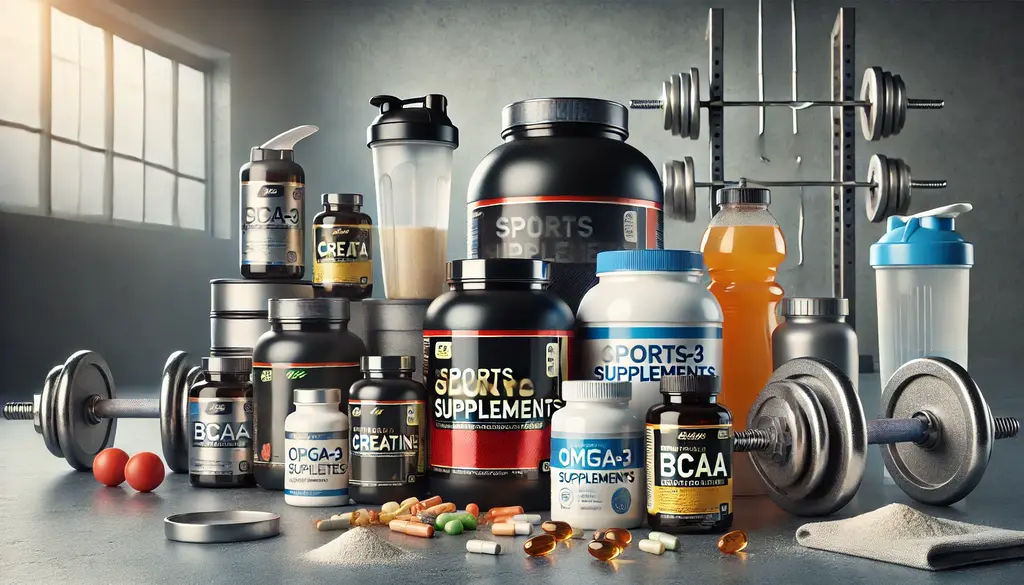
Sports supplements can be beneficial, but they do not replace a balanced diet. Their main goal is to supplement the diet and help achieve sports goals. The most popular and scientifically based supplements include:
- Protein powders: Used for quick protein replenishment after workouts. Especially useful when there is no opportunity to immediately have a full meal. Types of protein include whey, casein, soy, and others.
- Creatine: A natural substance that helps produce energy for short-term intense loads. Studies show that creatine can increase strength and muscle mass during strength training.
- Omega-3 fatty acids: Important for joint and heart health. They can also help reduce inflammation in the body after intense workouts.
- BCAA (branched-chain amino acids): May help reduce muscle fatigue and speed up recovery after workouts.
- Electrolyte drinks: Useful for long workouts or in hot conditions to replenish the loss of salts through sweat.
Important: Before starting any supplements, consult with a doctor or sports dietitian. Some supplements may have side effects or interact with medications.
Common Nutrition Mistakes Among Athletes
Even experienced athletes sometimes make mistakes in nutrition. Here are some common mistakes to avoid:
- Insufficient calorie intake: This can lead to muscle loss, reduced performance, and an increased risk of injuries. Make sure your diet matches your energy expenditure.
- Skipping breakfast: Breakfast provides energy for the first half of the day and “kickstarts” metabolism. Skipping breakfast can lead to overeating later and reduced efficiency in morning workouts.
- Dehydration: Even slight dehydration can significantly reduce physical performance. Remember to drink enough water throughout the day, not just during workouts.
- Overconsumption of fast food: Although the temptation to snack on something quick and calorie-dense can arise, regular consumption of fast food can lead to weight gain and reduced diet quality.
- Excessive use of sports supplements: Supplements should complement, not replace, a complete diet. Overuse of certain supplements can be harmful to health.
- Unbalanced diet: Consuming too much of some nutrients and not enough of others. For example, excessive protein intake with a lack of carbohydrates.
- Improper timing of meals: Eating right before a workout can cause discomfort, while skipping meals after a workout can slow recovery.
Preventing Digestive Issues
Intense training can cause digestive issues such as heartburn, nausea, or diarrhea. To avoid this, follow these tips:
- Do not eat immediately before training: Give food time to digest. Ideally, eat 2-3 hours before a workout.
- Avoid fatty and heavy foods before workouts: They digest slowly and can cause discomfort.
- Gradually increase fiber intake: Fiber is beneficial, but a sharp increase in its amount in the diet can cause gas and bloating.
- Drink enough water: This helps prevent constipation and promotes healthy digestion.
- Eat slowly and chew food thoroughly: This makes the digestion process easier and reduces the risk of stomach problems.
- Experiment with pre-workout snacks: Find foods that are well tolerated by your body during workouts.
- Consider using probiotics: They can help improve digestion and strengthen the immune system.
Individual Approach to Sports Nutrition
It is important to remember that there is no universal nutrition plan that suits all athletes. What works for one person may not suit another. Here are some factors to consider when developing an individual nutrition plan:
- Type of sport: Strength sports require more protein, while endurance sports need more carbohydrates.
- Intensity and frequency of workouts: The more intense the workouts, the more energy the body needs.
- Individual goals: Gaining muscle mass, losing weight, or maintaining current form—all require different nutritional approaches.
- Food preferences and allergies: The nutrition plan should take into account your taste preferences and any dietary restrictions.
- Lifestyle: The nutrition plan should be realistic and fit into your daily schedule.
- Genetics and metabolism: Some people digest certain foods better than others.
It is recommended to keep a food and training diary to track how different foods and eating patterns affect your performance and well-being. This will help adjust your diet over time to achieve optimal results.
Conclusion

Proper sports nutrition is not just a set of strict rules but rather the art of listening to your body and providing it with everything needed to achieve your goals. Let’s summarize the key points discussed in this article:
- A balanced diet, including an optimal ratio of proteins, fats, and carbohydrates, is the foundation of sports nutrition.
- Hydration plays a critical role in maintaining athlete performance and health. Remember to drink enough water before, during, and after workouts.
- The timing of meals relative to workouts can significantly affect your results. Proper nutrition before and after workouts helps maximize training efficiency and speed up recovery.
- Sports supplements can be a useful addition to the diet, but they do not replace complete nutrition. Always consult with a specialist before starting any supplements.
- An individual approach and attention to your body’s reactions are key to optimizing nutrition. What works for one athlete may not suit another.
- Avoid common nutrition mistakes, such as insufficient calorie intake, dehydration, or excessive fast food consumption.
- Monitor your digestion and take measures to prevent problems, especially during periods of intense training.
Remember, the path to optimal sports nutrition is a process. Don’t be afraid to experiment and adjust your diet. Keep a food and training diary to track how different foods and eating patterns affect your performance and well-being.
If you have doubts or questions about your nutrition, do not hesitate to seek professional help. Consulting a qualified sports dietitian or doctor can help you develop a personalized nutrition plan that best suits your individual needs and goals.
Remember, proper nutrition is not a short-term diet but a lifestyle. Implement changes gradually, and over time, you will notice improvements in your sports performance, overall well-being, and health.
We hope this article has helped you better understand the basics of sports nutrition and inspired you to make your diet more balan

